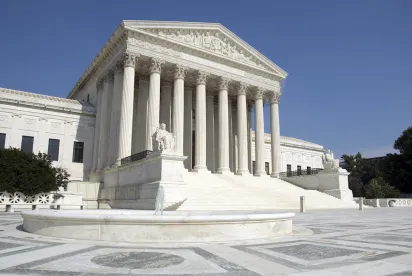The Supreme Court today dismissed as “improvidently granted” a case involving an unnamed law firm seeking to prevent the U.S. government from accessing the records of a client accused of violating tax laws. The law firm had previously asserted that the documents at issue were protected under attorney-client privilege. In re Grand Jury, Dkt. No. 21-1397. The case presented the issue of whether a communication involving both legal and non-legal advice is protected by attorney-client privilege when obtaining or providing legal advice was one of the significant purposes behind the communication.
Almost all cases reach the U.S. Supreme Court’s merits docket through discretionary grants of writs of certiorari. In this case, in a one sentence per curiam decision, the Court noted merely that “[t]he writ of certiorari is dismissed as improvidently granted,” without further elaboration. This meant that, in the judgment of the Court, certiorari should not have been granted in the first instance. A dismissal of a writ as improvidently granted (“DIG”) is rarely issued. This is notwithstanding that going back to hearings in Congress for the Judges’ Bill, Justice Willis Van Devanter in 1925 mentioned that under certain limited circumstances (for instance, facts coming to the Justice’s attention after certiorari was granted), the Court would DIG the case.
Here, the dismissal is significant for other data breach and cybersecurity cases. The Supreme Court’s dismissal leaves intact the prior ruling of the Ninth Circuit from September 2021. 13 F.4th 710 (9th Cir. 2021). There, the grand jury issued subpoenas related to a criminal investigation. The district court held a law firm and its client (an unnamed company) in contempt after they failed to comply with the subpoenas. The district court had ordered the law firm to produce documents to the government after redacting tax-related legal advice. The district court ruled that certain dual-purpose communications between the law firm and its client were not privileged because the “primary purpose” of the documents was to obtain tax advice, not legal advice. Before the Ninth Circuit, the law firm and its client (collectively, “appellants”) argued that the district court erred in relying on the “primary purpose” test and should have instead relied on a broader “because of” test. The Ninth Circuit, however, affirmed and concluded that the primary-purpose test governs in assessing assertions of attorney-client privilege for dual-purpose communications.
Had the Supreme Court addressed the substantive issues presented in the case, there was the potential for it to resolve a muti-circuit split concerning the way that federal courts assess privilege claims for dual-purpose communications (an issue that can frequently arise in the context of an investigation launched in response to a data incident, which Privacy World’s Kristin Bryan and others have previously covered). Instead, the Ninth Circuit’s ruling will stand—meaning that corporate entities may have the unintended consequence from the ruling in incurring greater costs for obtaining legal advice in nuanced situations (including potentially ones related to data privacy). Consistent with this assessment, the U.S. Chamber of Commerce had filed an amicus brief in the In re Grand Jury case, emphasizing that the Ninth Circuit’s test will cause businesses to engage in more “siloed” communications with their counsel or alternatively seek more advice from outside counsel.






 />i
/>i

